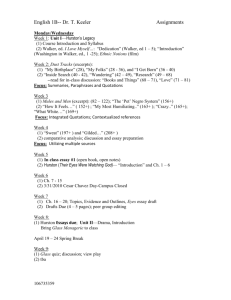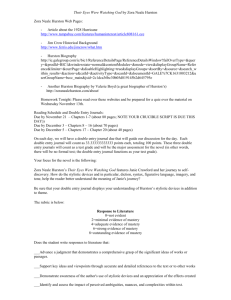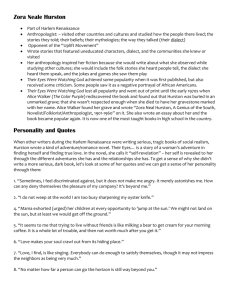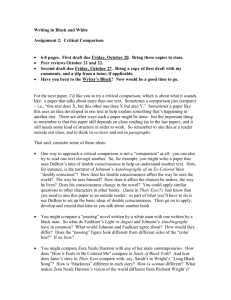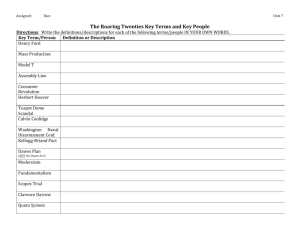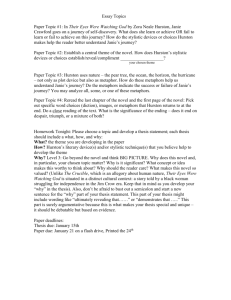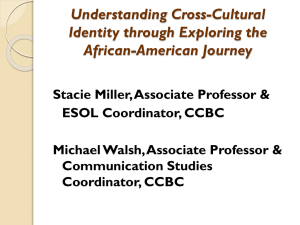WORDLY WISE 3OOO® ONLINE
advertisement
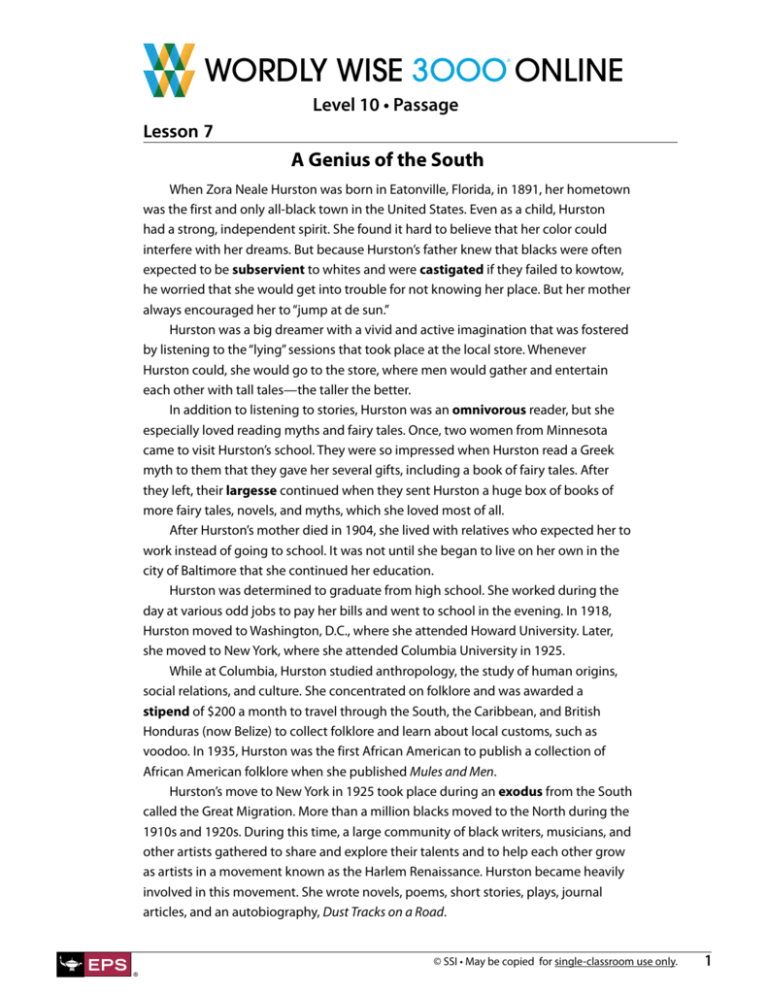
WORDLY WISE 3OOO ONLINE ® Level 10 • Passage Lesson 7 A Genius of the South When Zora Neale Hurston was born in Eatonville, Florida, in 1891, her hometown was the first and only all-black town in the United States. Even as a child, Hurston had a strong, independent spirit. She found it hard to believe that her color could interfere with her dreams. But because Hurston’s father knew that blacks were often expected to be subservient to whites and were castigated if they failed to kowtow, he worried that she would get into trouble for not knowing her place. But her mother always encouraged her to “jump at de sun.” Hurston was a big dreamer with a vivid and active imagination that was fostered by listening to the “lying” sessions that took place at the local store. Whenever Hurston could, she would go to the store, where men would gather and entertain each other with tall tales—the taller the better. In addition to listening to stories, Hurston was an omnivorous reader, but she especially loved reading myths and fairy tales. Once, two women from Minnesota came to visit Hurston’s school. They were so impressed when Hurston read a Greek myth to them that they gave her several gifts, including a book of fairy tales. After they left, their largesse continued when they sent Hurston a huge box of books of more fairy tales, novels, and myths, which she loved most of all. After Hurston’s mother died in 1904, she lived with relatives who expected her to work instead of going to school. It was not until she began to live on her own in the city of Baltimore that she continued her education. Hurston was determined to graduate from high school. She worked during the day at various odd jobs to pay her bills and went to school in the evening. In 1918, Hurston moved to Washington, D.C., where she attended Howard University. Later, she moved to New York, where she attended Columbia University in 1925. While at Columbia, Hurston studied anthropology, the study of human origins, social relations, and culture. She concentrated on folklore and was awarded a stipend of $200 a month to travel through the South, the Caribbean, and British Honduras (now Belize) to collect folklore and learn about local customs, such as voodoo. In 1935, Hurston was the first African American to publish a collection of African American folklore when she published Mules and Men. Hurston’s move to New York in 1925 took place during an exodus from the South called the Great Migration. More than a million blacks moved to the North during the 1910s and 1920s. During this time, a large community of black writers, musicians, and other artists gathered to share and explore their talents and to help each other grow as artists in a movement known as the Harlem Renaissance. Hurston became heavily involved in this movement. She wrote novels, poems, short stories, plays, journal articles, and an autobiography, Dust Tracks on a Road. © SSI • May be copied for single-classroom use only. ® 1 Wordly Wise 3000®Online Level 10 • Passage • Lesson 7 Hurston’s love of her heritage permeates her work; in her writings she uses the colloquial speech of her upbringing in the South. Hurston’s writing met with controversy because some people felt that she was advancing the stereotype that blacks were poorly educated people incapable of speaking correct English. But she felt that her rendition of Southern black life was not only accurate, it expressed a colorful and fanciful use of language of which, she felt, blacks could be proud. After the Harlem Renaissance, the popularity of Hurston’s work began to fade, and publishers lost interest in her work. Her death in 1960 was publicly overlooked except for a small obituary in Time magazine. Pulitzer Prize-winning author Alice Walker was extremely disturbed that Hurston was not better recognized for her greatness as an artist while she was alive. Walker visited Hurston’s unmarked grave in 1973. She was offended to find an unkempt graveyard with a tangle of overgrown weeds and shoulder-high bushes. Thorns lacerated Walker’s bare legs as she made her way through the abandoned graveyard, searching for the grave where Hurston’s body had been interred thirteen years before. Once she found the grave, she ordered a handsome gray stone to mark the grave site. The epitaph reads “Zora Neale Hurston, A Genius of the South, Novelist, Folklorist, Anthropologist.” It is largely due to Alice Walker’s efforts that there has been a resurgence of interest in Hurston’s writings, and all her books are back in print. Her best-known work, Their Eyes Were Watching God, is now recognized as a classic. Answer each question in the form of a sentence. If a question does not contain a word from the lesson, use one in your answer. Use each word only once. castigate 1. Is it accurate to say that Hurston only read myths as a child? colloquial epitaph exodus ___________________________________________________________________ ___________________________________________________________________ 2. Why did Hurston’s father worry about her when she was a girl? inter lacerate ___________________________________________________________________ largesse ___________________________________________________________________ obituary 3. What did Hurston do with the $200 stipend that she was awarded? omnivorous permeate rendition ___________________________________________________________________ ___________________________________________________________________ 4. When did Hurston move to New York? resurgence stereotype ___________________________________________________________________ stipend ___________________________________________________________________ subservient 5. How does the author of the passage suggest that Hurston appreciated the Southern black culture in which she grew up? ___________________________________________________________________ ___________________________________________________________________ © SSI • May be copied for single-classroom use only. ® 2 Wordly Wise 3000®Online Level 10 • Passage • Lesson 7 6. Why was Hurston’s writing met with controversy? ___________________________________________________________________ ___________________________________________________________________ 7. How might those who knew her have learned of Hurston’s death? ___________________________________________________________________ ___________________________________________________________________ 8. What was Walker looking for in 1973? ___________________________________________________________________ ___________________________________________________________________ 9. What did Walker do to acknowledge Hurston’s contribution to literature and anthropology? ___________________________________________________________________ ___________________________________________________________________ 10. What has been the result of Walker’s interest in Hurston’s work? ___________________________________________________________________ ___________________________________________________________________ •Two Greek words, exo, meaning “out,” •The Latin verb vorare, meaning “to •The Latin prefix omni- means “all” and •By combining the Latin prefix omni-, and hodos, meaning “way,” combine to form exodus. Exodus is also the name of the second book of the Old Testament, which tells of the Jews’ flight from slavery in Egypt. is found in several English words. To be omnipotent is to be all-powerful. To be omniscient is to be all-knowing. To be omnipresent is to be present everywhere. The word bus is a shortened form of omnibus, which originally referred to a vehicle that was available for all who wished to use it. devour,” forms the root of several English words. An herbivorous animal eats only plants. A carnivorous animal eats only meat. A voracious appetite is one not easily satisfied. meaning “all,” with the Latin root vorare, meaning “to devour,” we form the word omnivorous. An omnivorous creature is one that eats products from both animals and plants. © SSI • May be copied for single-classroom use only. ® 3
